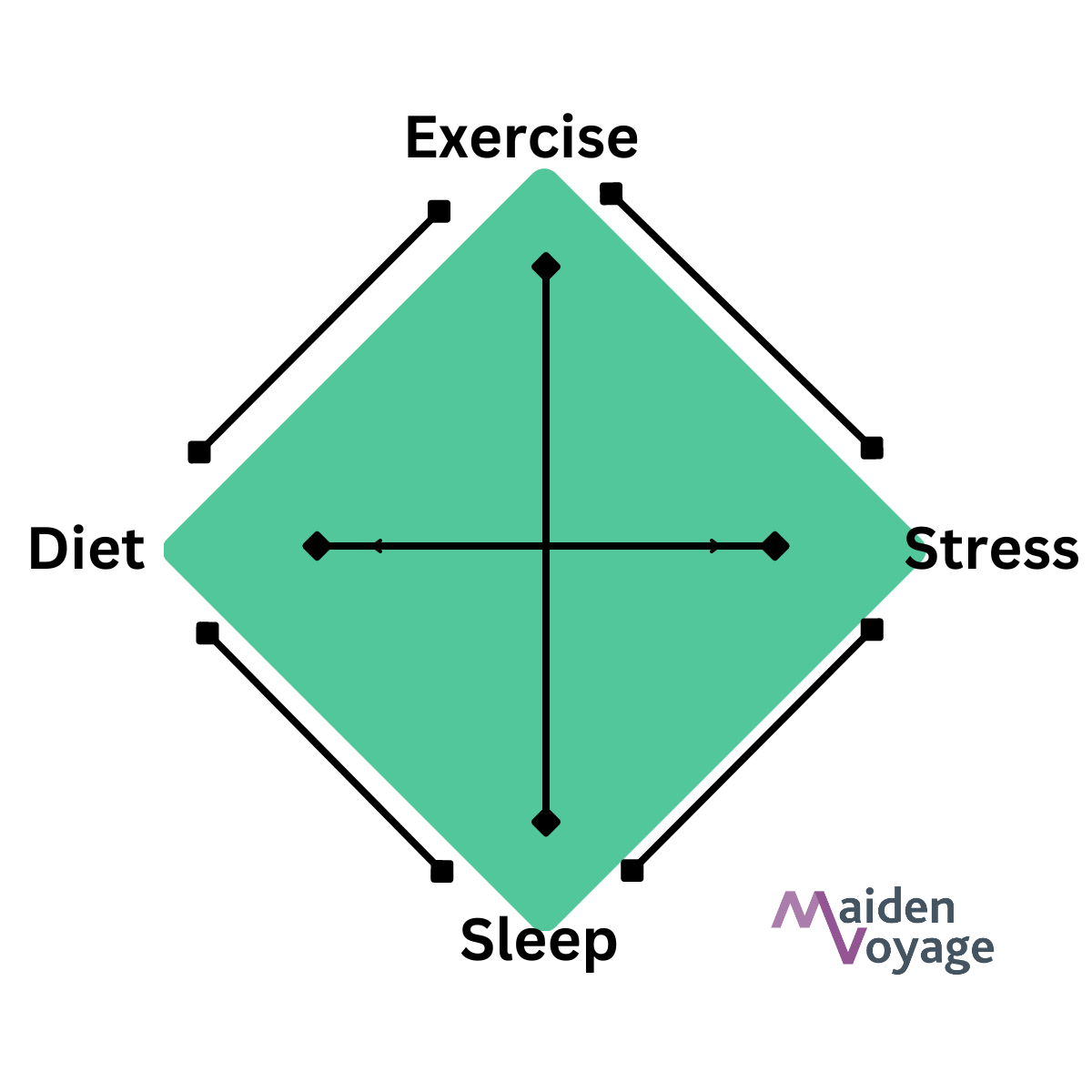
Since the COVID-19 pandemic many of us are paying greater attention to our physical, mental and emotional wellbeing. Hybrid working has given us greater control over our time and with more readily available information, health-tech and products, we’re all better placed than ever to take control to improve our wellbeing.
We might have our home-health routines nailed or at least know what we ‘should’ be doing when it comes to sleep, diet, exercise and stress management but how do we maintain those healthy habits when we’re travelling for business?
In a recent poll, we asked business travellers, which aspects of their wellbeing they struggled with the most when on the road.
This is what they told us:
- Sleep 38%
- Diet 38%
- Exercise 14%
- Stress management 10%
Sleep
Routine disruptions, crossing time zones, noisy hotels, pressure to go out for business dinners, and sleeping in a strange bed all notably contributed to a poor night’s sleep. The sleepless nights don’t stop there, exhausted travellers typically struggle to sleep when they get back home, often suffering from jetlag or trying to adjust back to their home routine and time-zone. Cumulative sleep deprivation or building up sleep debt can pose long-term serious side effects for our health.
Diet
A more home-based life has given us the opportunity to really manage and control our food intake. These days lots of people are committed to particular regiments such as following a KETO based diet, intermittent fasting or low-carbs. More generally, many have specific medical related dietary requirements, allergies or food intolerances.
Life on the road makes it hard to find healthy food at the time you want to eat it playing havoc with our home-based eating patterns. With erratic schedules, business travellers tell us that they eat what and when they can as they don’t always know when they will get the chance to eat next. Often, we have little control over our schedules, having to comply with social engagements and compromise eating regimens in order to fit in with others. Numerous travellers told us that they found pressure to drink alcohol concerning, made worse by the absence of healthy alcohol-free alternatives.

Exercise
More people than ever before have taken up running as a means to stay fit or beat stress, however many runners don’t feel safe running in a strange place. Concerns about personal safety, traffic and air pollution and lack of free time are some of the reasons why business travellers skip their regular runs. Punishing work schedules and lack of access to facilities also inhibit our ability to keep fit whilst travelling when we’re away from our regular gym classes or personal trainers.
Stress management
Stress and concerns about travel disruption, trying to fit everything in, (including keeping in touch with family across different time zones), missing regular therapy sessions, staying on top of work back at the office and concerns about personal safety all contribute to increased stress levels when we’re away from home.
What becomes apparent however is how each of the 4-pillars of wellbeing impact each other. For example, fatigue will increase our stress levels and is likely to drive us to binge eat larger amounts of unhealthy foods such as fat, sugar or unhealthy carbs. It’s hard to sleep on a full stomach or rich food and lack of exercise makes it difficult for us to regulate our stress levels. The cognitive ability of stressed or exhausted travellers will decline, leading to poor decision-making and could escalate personal safety risks or lead to accidents.
The ideal is a holistic balance across all four pillars but almost impossible to maintain in practice when we are away from home and our regular routines.
Travellers subjected to sustained and punishing business travel schedules could experience long-term effects on their mental, physical and emotional wellbeing. According to a recent BCD traveller survey, only 1 in 10 companies have policies which allow for extra time off during or after a business trip.
The business case for investing in business traveller wellbeing is indisputable, it’s the right thing to do, we have a responsibility and a duty of care to our people (as they do have to themselves), it will garner staff retention, reduce burnout, and ultimately help people and organisations to perform at their best.
Whilst individuals are ultimately responsible for their own health and wellbeing, travel managers and travel industry suppliers can facilitate business travellers in achieving a holistic balance. We asked a group of travel industry experts and business travellers at the recent Business Travel Show to share their thoughts on how we can achieve a healthier balance when on the road.
This is what they told us:
Managing better sleep
- Some companies allow employees to take time off during or after a business trip to make up for the time that they were away and to catch up on sleep. Many have wellbeing policies focusing on rest time and don’t expect employees in the office on the days following an international trip.
- Employees can state their room preferences when booking a hotel, requesting a quiet room away from elevators or in a quieter area of the hotel will help.
- Employees need to feel safe and secure where they are sleeping and in particular when staying in individual properties such as Airbnb’s.
- Giving employees the autonomy to choose when they fly will help them to manage their sleep needs. For many, the thought of having to get up for an early departure will mean that they struggle to sleep the night before for fear of missing the alarm clock.
- Factoring in an extra day before key meetings can help as many recognised that they struggle to sleep the first night in a strange bed. This could also help with those who have an ongoing problem with insomnia at home as well.
Dietary management
- Travellers can research food options at airports, hotels and surrounding areas in advance of a trip in order to plan what and when they will eat.
- Some hotels may allow food delivery services for those not wishing to leave the hotel.
- Encourage employees to respect that not everybody will want to socialise, participate in evening events or consume alcohol and that they shouldn’t pressure them to do so.
- For hosts and those organising events, remember to ask visitors and attendees in advance for any dietary requirements.
- Employees can take a range of healthy snacks with them on their trips and remember to stay hydrated by taking a refillable water bottle with them.

Exercising when travelling
- The easiest option is to allow employees to select hotels where there are fitness or pool facilities. Some employers offer roaming gym memberships to enable their business travellers to use different facilities whilst they are travelling. In some cases, hotels and gyms will rent out gym clothing. It’s worth noting that some hotels in the Middle East restrict access to these facilities for women.
- Some hotels will provide yoga mats or have an exercise TV channel or simply allowing access to sites such as Youtube, allow travellers to use free online exercise videos such as Yoga with Adriene
- Some hotels are able to provide running maps highlighting safe, local routes for guests to get outside for a run or walk.
- Information about local Park Runs or running groups will allow runners to feel safe and provide a mental health boost by running with others.
Stress management
- A well-planned trip will help to reduce stress. Knowing where we are going, how we are getting there, alternative routes and event itineraries and timings will take away the uncertainty that often leads to stress.
- Knowing who to contact in case of an emergency when you’re on your trip will provide a sense of security. Travellers should travel with details of their travel risk management providers, the local embassy, travel insurance policy and telephone numbers, in country emergency services and details of any local offices or contacts.
- Reviewing in advance any airport maps or those large-scale venues will help travellers to plan their routes and timings to cut down on stress.
- Downloading and using mindful and mediation apps such as can Headspace can help travellers to centre themselves and zone out from the daily stresses.
- Employees should take cues from colleagues as to whether they would like their own space or are feeling lonely and in need of company and do your best to support them.
By adopting some of these strategies, individuals, travel industry suppliers and employers can improve the holistic health for their business travellers.
Finally, not all business travellers have total control over how they travel and as employers we should never make assumptions about what people need. That’s why we always recommend asking ‘magic questions’:
- “Do you feel comfortable, safe and well to be taking this trip?”
- “What more can we (the employer) do to support you in taking this trip?”